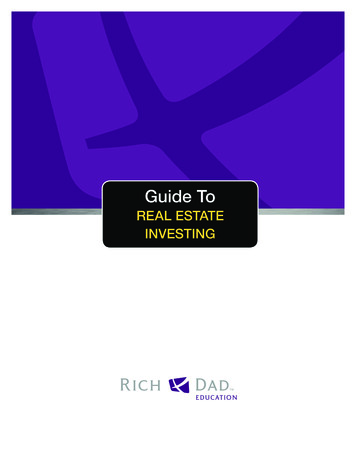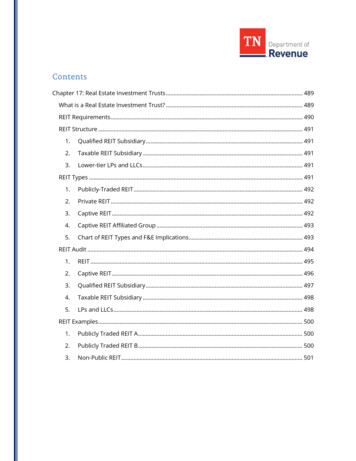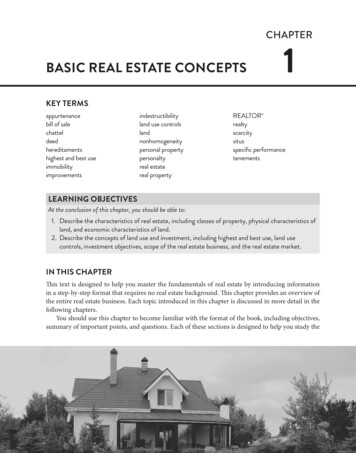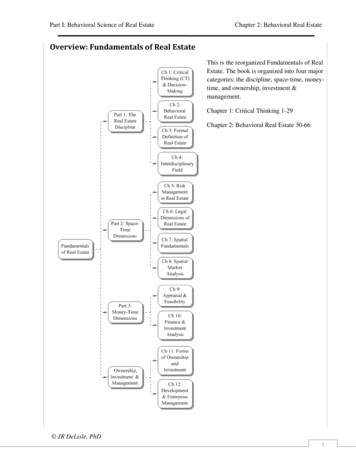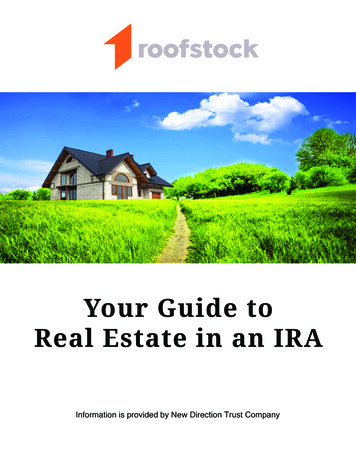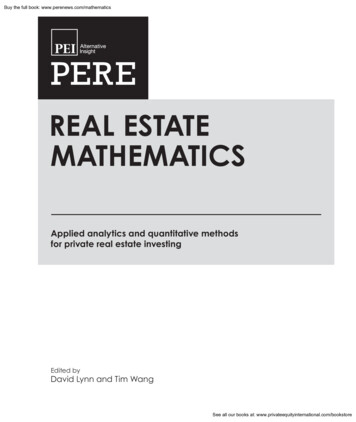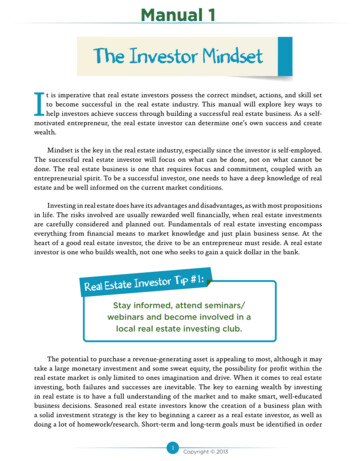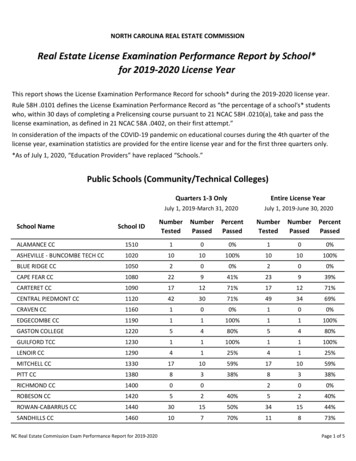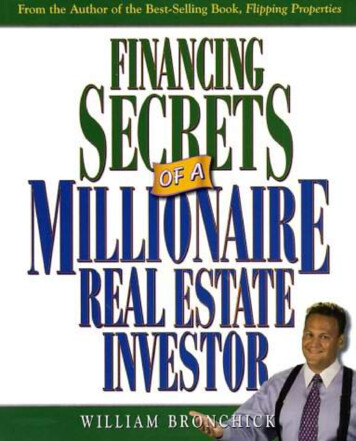
Transcription
Real estateA guide for buyers and sellersconsumer.vic.gov.au
Real estate: A guide for buyers and sellersThis guide covers the basic steps in a residential realestate transaction in Victoria, in the order you wouldnormally experience them when buying or sellingproperty. The guide also includes laws regulating theconduct of agents and conveyancers in that process.DisclaimerBecause this publication avoids the use of legallanguage, information about the law may have beenexpressed in general statements. This guide shouldnot be relied upon as a substitute for the EstateAgents Act 1980, the Conveyancers Act 2006, the Saleof Land Act 1962 or professional legal advice.Copyright State of Victoria 2012No part may be reproduced by any process exceptin accordance with the provisions of the CopyrightAct 1968. For advice on how to reproduce anymaterial from this publication contact ConsumerAffairs Victoria.Published byConsumer Affairs VictoriaDepartment of Justice121 Exhibition StreetMelbourne Victoria 3000Authorised by the Victorian Government121 Exhibition StreetMelbourne Victoria 3000Print managed by Finsbury GreenISBN: 1 921079 56 8Additional copiesThis guide is available from Consumer Affairs Victoria, consumer.vic.gov.au.
ContentsContentsIntroduction . 4Finance . 8Choosing a lender . 9First Home Owner Grant .10The estate agent’s responsibilitiesto the buyer . 11Buyer’s advocates . 12Advertising . 12The agent-principal relationship . 12Conveyancing, vendor’s statement(section 32), owners corporation andbuying off the plan . 13Conveyancers . 14Legal practitioners . 14The vendor’s statement . 15Owners corporations . 15Property schemes . 16Buying off the plan . 17The estate agent’s responsibilitiesto the seller . 18Selecting an agency . 19Marketing your property . 20The estimated selling price . 20Price misrepresentation– underquoting and overquoting . 20Commissions . 20Commission sharing . 21Advertising and other outgoings . 21Rebates . 22The authority to sell . 22Authority types . 22What can be negotiated? . 23The Australian Consumer Lawand contracts . 23Selling without a real estate agent . 24Methods of saleand the sales campaign . 25Private sale . 26Public auction . 26Deciding on a method of sale . 26The reserve or asking price . 27The advertised price . 27Locating and inspecting properties . 28Locating properties for sale . 29Inspections.30Professional building inspections . 30Pest inspections . 31Assessing the sustainability of homes . 31Vacant land . 32Domestic building insurance . 32Owner-built properties . 32Private sales . 33Making an offer . 34Conditional offers . 34Negotiation . 34Contract of sale . 34GST . 35Settlement period . 35Cooling-off period . 35When is it sold? . 36Sale by auction . 37Pre-auction offers and inspections . 38Auction rules . 38Auction conduct . 38Vendor and co-owner bids . 39Illegal bidding . 39Bidding at an auction . 39‘On the market’ . 40When is it sold? . 40‘Passed in’ . 40Advertising after an auction . 40After the sale . 41Before taking possession . 42Taking possession . 43Disputes and complaints . 43Buyer’s checklist . 44Seller’s checklist . 45Glossary . 46Useful contacts . 503
Real estate: A guide for buyers and sellersIntroduction4
IntroductionMaking the right choicesBuying or selling a home can be complexand time-consuming. Even before youmake the ‘big decisions’ about whichproperty to buy, which home loan toselect, or which agent you engage to sellyour home, you have other importantdecisions to make.You are more likely to make the rightchoices and avoid expensive mistakesby doing your research.Know what you wantStart by making a list of all the essentialfeatures you require in your property.Then write a separate wish list of desiredbut non essential characteristics, to factorinto your decision making when you findthem in a property you can afford.Be informedLearn as much as you can: research the market value of property educate yourself about building terms attend auctions and monitor results.Seeking advice from different sources willgive peace of mind that you are gettingvalue for money and your needs are beingmet. Increasingly, service providers aredeveloping smartphone apps that canassist with finding properties or funding ahome purchase.Buyers’ and sellers’ checklistsat the back of this guide provideprompts which can be helpfulin ensuring you don’t miss anyimportant steps.Dealing with an estate agentAlthough you can buy and sell propertydirectly, most people will deal withan agent.Laws govern the licensing and conductof agents. These laws prohibit unethicalpractices such as misrepresentations aboutproperty including the price, location, sizeand dummy bidding at auctions.Shop aroundEducate yourself about the productsand services offered by agents, legalpractitioners, conveyancers, buyer’sadvocates, mortgage brokers and lenders.There are many free services or sourcesoffering advice – by shopping around youcan put their advice into context. Websites– including the Consumer Affairs Victoriawebsite consumer.vic.gov.au – can be anexcellent source of information.5
Real estate: A guide for buyers and sellersLicensed estate agents and agents’representativesA person or company acting as an estateagent, advertising that they are carryingon the business of an estate agent or whoholds themselves out as being ready to actas an estate agent for payment must belicensed as an estate agent in Victoria.An agent’s representative must meetprescribed eligibility requirements andbe employed by a licensed estate agentwho is responsible for the conduct of theagent’s representative.Only deal with a licensed agent oran authorised agent’s representative.To check whether someone is a licensedagent or an agent’s representative, contactthe Business Licensing Authority on 1300135 452 or search the public register oflicensed agents at bla.vic.gov.au.Take your timeNever rush or be pressured into makinghasty decisions. There is a lot of moneyat stake and you will be paying yourmortgage off over many years. Make sureyou are committing to the right propertyfor you.Thorough research can save you timeand money – for example, you can avoidpitfalls like costly and time consumingbuilding and planning issues.6Consider a building inspectionBefore signing a contract of sale, considerengaging an independent qualifiedbuilding inspector, surveyor or architect toprovide a building inspection report.The fee for a professional inspection serviceis small compared with the cost of buyinga property that needs unforeseen repairs.A qualified inspector will know what tolook for and will see through any cosmeticimprovements that cover up faults.The inspector will provide a written reportlisting: faults in the property whether they can be repaired how much these repairs are likely to cost.You may be able to use the report to: negotiate the price and contractconditions with the seller develop a maintenance programif you decide to buy.Use an inspection service with fullprofessional indemnity insurance.This will protect you if the inspectionmisses a problem that must be fixed.
IntroductionRead before you signDefinitionsWhile buying or selling you will comeacross different types of contracts suchas loan contracts, authorities to sell andcontracts of sale.For the purposes of this guide, the:Ensure you understand all terms,conditions and fine print. Make sureanything agreed to verbally is put inwriting so you know exactly what you arecommitting yourself to. vendor or owner of the property beingsold is referred to as the seller mortgagee is referred to as the lender mortgagor is referred to as theborrower purchaser is referred to as the buyer.You can find further definitions in the glossaryon page 46.Make sure you read and fullyunderstand what you aresigning, before you sign it.If something is unclear, ask for anexplanation. If you are still uncertain, it isbetter to wait and seek professional advicebefore signing. You should keep a copyof all documents you have signed as arecord.Foreign investorsIf you are enquiring about buyingproperty in Australia and you are not anAustralian citizen or permanent resident,contact the Foreign Investment ReviewBoard at firb.gov.au for more information.7
Real estate: A guide for buyers and sellersFinance8
FinanceBuying a property is a significant andongoing financial commitment. As abuyer, you should spend time workingout exactly what you need and can afford.Get your finances in order before youstart looking for a property. For help tomake smart choices about your personalfinance, visit moneysmart.gov.au.Choosing a lenderChoosing the right home loan is asimportant as choosing the right home.Researching and understanding the homeloan market will help you to choose themost appropriate loan for you.You can use mortgagecalculators on financial providerswebsites to work out your loanrepayments.The main types of lenders are: Banks Building societies Credit unionsMortgage brokers act on behalf of lenders.There is intense competition amongstlenders who offer a variety of packages,options and methods of payment. Theloan that appears to be the cheapestbecause it has the lowest interest rate maynot necessarily be the cheapest in the longterm when fees, ongoing charges andpenalties are included.The cheapest loan may also be less flexibleand have fewer extras than other loans.Speak with several lenders about yourcircumstances to work out the best type ofloan. You can ask them to justify the rate,fees and method of repayment. Take intoaccount what each lender is offering whenmaking your decision.Most lenders will approve a loan inprinciple (‘pre-approval’), allowing you tobe confident of your spending limit. Preapproval is only valid for a limited periodand needs to be renewed after this period.Pre-approval does not guarantee loanapproval. The lender still needs to makeadditional enquiries into your financialstanding before approving the loan.You should speak to your lender aboutwhat pre-approval means.Typically there are three areas thatlending providers look at when approvingyour loan: how you will service the loan what equity you will have in theproperty your credit rating9
Real estate: A guide for buyers and sellersFirst Home Owner GrantThe First Home Owner Grant provideseligible first home owners with a oneoff payment. Some lenders will help toarrange the First Home Owner Grantapplication for you.Eligibility criteria and application forms areavailable from the State Revenue Office atsro.vic.gov.au.10For information aboutbudgeting, saving, loans,insurance and all othercredit-related issues, call the AustralianSecurities and Investments Commission(ASIC) Infoline 1300 300 630 or visitmoneysmart.gov.au.
The estate agent’s responsibilities to the buyerThe estate agent’sresponsibilities to the buyer11
Real estate: A guide for buyers and sellersAs a buyer, you will not pay an agent forservices provided in selling the property.Buyers may deal with several agents oragent’s representatives, depending onwho is handling the sale of the propertythey are interested in.You can leave details with one or moreagents indicating the type of propertyyou are seeking and an approximate pricerange. The agent may contact you whensuitable properties become available.As a buyer, you can expect an agent to: take your details and provide adviceabout relevant properties for sale answer your questions about listedproperties arrange inspections provide you with a copy of the vendor’sstatement and contract of sale whenavailable communicate genuine offers from youto the seller organise the signing of the contractof sale.Buyer’s advocatesA buyer’s advocate is a licensed estateagent who, for a fee or commission, actsfor a buyer instead of a seller. They cansource properties, bid at auction andgenerally represent a buyer throughoutthe buying process.12AdvertisingAn estate agent must not misrepresentthe price of a property for sale or lease.The advertised price must be fair andreasonable and reflect the instructions ofthe seller and the opinion of the agent ofthe property’s selling price.Any changes to the seller’s instructionsor agent’s opinion during a marketingcampaign likely to affect the selling pricemust be reflected in the advertised price.For example, if a higher offer is made for aproperty and rejected, the advertised pricemust be updated unless the seller changestheir mind.The agent-principal relationshipThe relationship a seller has with anagent is different to the relationship theagent has with a buyer. Agents mustact responsibly and ethically whendealing with both buyers and sellers.But buyers should be aware that themain responsibility of the agent sellingthe home is to the seller.
Conveyancing, vendor’s statement (section 32),owners corporation and buying off the planConveyancing, vendor’s statement(section 32), owners corporationsand buying off the plan13
Real estate: A guide for buyers and sellersThe transfer of ownership of land from theseller to the buyer is called a conveyanceof land. This is usually undertakenwith the help of a legal practitioner orconveyancer. Buyers and sellers shouldengage their own legal practitioner orconveyancer.ConveyancersA conveyancer is someone, other thana legal practitioner, who is licensed toundertake property conveyancing workand to do legal work or give legal adviceabout the transfer of title.Conveyancers can be engaged by a sellerto prepare the vendor’s statement andother legal documentation, such as thecontract of sale. They can be engaged bya buyer to check the vendor’s statement,advise on the terms and conditions in thecontract of sale and conduct searches.Licensed conveyancers must haveprofessional indemnity insurance.Get written quotes before choosing a legalpractitioner or conveyancer.If you use a conveyancer, makesure that they are licensed. Youcan check if someone is licensedby contacting the Business LicensingAuthority on 1300 13 54 52 or bysearching the public register of licensedconveyancers at bla.vic.gov.au.14Legal practitionersA legal practitioner must hold a currentpractising certificate and have professionalindemnity insurance.Legal practitioners can perform generallegal work and provide legal advice.Some legal practitioners specialise inconveyancing and property law.Sellers can engage a legal practitioner toprepare all the required documentation,including the vendor’s statement and thecontract of sale. Legal practitioners canalso be engaged by buyers to review andadvise on the vendor’s statement andthe contract of sale, and ensure that thetransfer of title is done correctly.SELLER’S TIPMake sure all charges includingdisbursements (additional administrativecosts) are discussed and understoodbefore you engage a legal practitioner orconveyancer.
Conveyancing, the vendor’s statement (section 32),owners corporation and buying off the planThe vendor’s statement (section 32)Before a property is sold, the sellermust provide the buyer with a vendor’sstatement or section 32.BUYER’S TIPBefore you make an offer on a property orbid at an auction, have a legal practitioneror conveyancer carefully check thevendor’s statement. You should alsoconsider getting a building inspectionfrom a qualified building inspector.This is usually prepared by the seller’slegal practitioner or conveyancer. It is thensigned by the seller and made available toprospective buyers, usually by the agentbefore the sale or auction. The buyer maythen have the statement checked by his orher own legal practitioner or conveyancerprior to purchase.Owners corporationsThe vendor’s statement containsinformation about the property’s title,including mortgages, covenants,easements, zoning and outgoings such asrates. It does not include any informationabout the condition of buildings, whetherthey comply with building regulations orif measurements on the certificate of title(or similar documents evidencing title) areaccurate. It is the buyer’s responsibility tofind out about anything not covered in thevendor’s statement.Where a plan of subdivision createscommon property, there must be anowners corporation. The owners arereferred to as lot owners or members.The information that must be includedin the vendor’s statement is outlined insection 32 of the Sale of Land Act 1962.This can be viewed online atlegislation.vic.gov.au.If you buy a unit, flat or apartment,you will be provided with your owncertificate of title. However, you are notjust purchasing the individual propertybut also the shared ownership of, and theright to use, common property as set outby the plan of subdivision.As a member of an owners corporation, youhave the right to vote on decisions about itsoperation. You will be required to contributeto costs for repairs, maintenance andinsurance for the common property sharedwith the other lot owners.The vendor’s statement is a legaldocument and must be factually accurateand complete. If the vendor’s statementcontains false, incorrect or insufficientinformation, a buyer may be able towithdraw from the sale or take legal action.15
Real estate: A guide for buyers and sellersBUYER’S TIPBuying in an owners corporation meansliving with common property– andcertain rights and responsibilities apply.Get more information at consumer.vic.gov.au,download the Guide to owning, managing andliving in an owners corporation.Before buying, make sure you carefullycheck: the cost of being a member of anowners corporation how the owners corporation operates,including whether it uses an ownerscorporation manager the vendor’s statement the owners corporation certificate,attached to the vendor’s statement,which states whether there are anyproposed works, fee increases orpotential or existing legal claimsaffecting the property the plan of subdivision, to determinelot boundaries and common property the contents and conditions of thecontract of sale the owners corporation rules any leases or licencesof common property minutes of previous annualgeneral meetings.16Property schemesProperties can be held under differentschemes. For example, if you’re buyinga unit, flat or apartment, you could bepurchasing a share in a company titlearrangement, a stratum title or a stratatitle. Get advice from a legal practitioneror conveyancer about how the type oftitle will affect your ownership, rights andresponsibilities.BUYER’S TIPObtain independent legal advice beforeyou buy a unit, flat or apartment tofind out about the advantages anddisadvantages of holding a title underthe different property schemes.If you are buying an investment property,check with your accountant, financialadvisor or the Australian Tax Officeabout allowable deductions for rentalproperties.
Conveyancing, the vendor’s statement (section 32),owners corporation and buying off the planBuying off the planBuying a house or unit before the buildingworks have been completed is knownas buying off the plan. In some cases,construction may not have started whilstin others it may only be partially built.The design of the building and sketchesof its final appearance may be includedin advertising material well beforeoccupation is possible.People are often attracted to off-the-plansales as there is a reduced amount ofduty (formerly stamp duty) to pay. Theamount depends on how advanced theconstruction of the building is and itscurrent value. If construction is close tocompletion, the duty is likely to be higher.You can get more information about dutyby visiting sro.vic.gov.au.Other benefits for buyers include moreinput into the design and a price at today’smarket value that is locked in at the timethe contract is signed.BUYER’S TIPIf you intend to buy off the plan, get afirm completion date in writing from thedeveloper. You should get legal advicebefore signing a contract.Buying off the plan without being ableto observe the finished product has risks,including: being unable to inspect the actualproperty. You have to rely on an artist’simpression, floor plan and advertisingmaterial for information about whatyou are paying for differences in the expected and actualquality of the final finishes unexpected changes to the plans orspecifications an uncertain completion date complex contracts limited recourse with the builder ifthere is a dispute. This is because thedeveloper, not the buyer, enters intoa major domestic building contractwith the builder property market volatility causingthe value of an off the plan homeat settlement to be less than thecontract price.If you buy off the plan and the plan ofsubdivision is not registered, the law protectsyou by requiring that the deposit is no morethan 10 per cent of the contract price.If the plan of subdivision is not registeredby the time specified in the contract or thedefault time of 18 months, you have theright to end the contract.17
Real estate: A guide for buyers and sellersThe estate agent’sresponsibilities to the seller18
The estate agent’s responsibilities to the sellerIf you list a property for sale with an agent,you are engaging that agent to help sellyour property. The agent must act in yourbest interests, including following yourlawful instructions and engaging in goodestate agency practice.The agent will charge you a fee for thisservice, usually in the form of a commission.The commission is negotiable and caneither be a percentage of the sale price, afixed fee or a combination of both. You canalso expect to pay an additional cost foradvertising associated with marketing yourproperty.You can expect the agent to: advise you about a method of sale provide you with a marketing planand market your property give you an estimated selling price orprice range based on their experienceand skill advertise an up-to-date price for theproperty reflecting rejected offers orchanged market conditions (althoughit is not compulsory for a price to beadvertised) communicate all verbal and writtenoffers from prospective buyers to you,unless you instruct the agent in writingnot to do so organise and attend open house andother inspections organise and conduct an auction ifapplicable arrange the signing of the contract receive and hold the full deposit.Selecting an agencyFor the seller, choosing an agency is animportant part of the selling process.To help you make this decision: check the internet and local papers tofind agencies, the services they offerand sale price information speak to friends about their experiences read promotional material from arange of agencies (including localagents who may be more familiar withthe local market) talk to agents.Ask the agent to provide writtenquotes, clearly detailing therate of commission they chargeand any additional charge for marketingyour property. Do not sign anything,including an authority, unless you areprepared to engage their services.Points to discussWhen you talk to agents, importantpoints to discuss include: their knowledge of the market andexperience selling homes in the areacomparable sales in the areatheir marketing plan for your propertypreparing your property for saletheir estimated selling pricetheir commission or feethe cost of advertising and otheroutgoings.19
Real estate: A guide for buyers and sellersMarketing your propertyWhen you’re choosing an agency, one ofthe most important factors to consider ishow they plan to market your property.Ask for a comprehensive, written marketingplan. This will be based on the agent’sexperience, the type of property and itslocation and any specific wishes you have.The marketing plan should includeadvertising methods and costs, and theprice or range at which the property willbe advertised.The estimated selling priceBefore you sign an authority to sell, theagent must provide you with an estimateof the selling price of your property. Thisis the price the agent estimates yourproperty is likely to attract, based ontheir experience, skill and knowledge ofthe market. It must be recorded in theauthority to sell as either a single amountor a price range.If estimate is recorded as a range, thedifference between the top and thebottom figures must not exceed 10 percent of the bottom figure. For example, aquoted range of 400,000 to 440,000 is 400,000 plus 10 per cent.This price is not a sworn valuation or aguaranteed selling price and it does nothave to be the same as the seller’s askingprice or auction reserve price.Price misrepresentation– overquoting and underquotingThe practice of deliberately overstatingthe estimated selling price to encouragea seller to appoint a particular agent isknown as overquoting.It is illegal for an agent to mislead a selleror prospective seller about the estimatedselling price.It is also illegal for an agent to advertiseor advise (whether orally or in writing)a prospective buyer of a price that is lessthan the seller’s asking price or auctionreserve price if known, or if there is nosuch price, the agent’s estimated sellingprice. This is known as underquoting.An auction reserve price is not usually setuntil the day of the auction.CommissionsMost agents obtain their fee from theseller in the form of a commission payableafter the sale is completed. An agentcannot obtain a commission without anauthority to sell signed by the seller.The agent must advise the seller thecommission is negotiable, before the sellersigns the authority to sell.There is no set commission; the amountis negotiable between the seller and theagent, and can be set at whatever amountboth parties agree on.The commission can be paid as either afixed fee or percentage of the sale price,and must be recorded on the authorityto sell. If it is recorded as a percentage, itmust also be shown as a dollar figure.20
The estate agent’s responsibilities to the sellerIf you are selling through an agentwho uses a commission scale, ensureit clearly and accurately outlines howmuch you will pay. For example, theagent’s commission may be 3.3 percent (including GST) on a scale up to 500,000 and 3.85 per cent (includingGST) if the price goes above 500,000.You may interpret this as only the amountabove 500,000 having a 3.85 percent commission; however, if the saleprice exceeds 500,000, the agent mayinterpret this as the entire sale price havinga 3.85 per cent commission.SELLER’S TIPDo not choose an agent just becausethey give you the highest estimatedselling price. Have several agentsappraise your property. You can ask themto justify their price by showing you, forexample, similar properties sold at similarprices in the area. Take into account theagent’s overall marketing plan whenmaking your decision.Commission sharingThe agent must advise you in writingif they will be sharing the commissionwith someone outside their own agency,such as a legal practitioner, conveyanceror another agent. A statement must bemade listing the people with whom thecommission is to be shared, before yousign the authority to sell.SELLER’S TIPClarify with the agent the exactcircumstances under which thecommission must be paid, before signingthe authority. Do not sign withoutcarefully reading and understandingthe authority to sell. If you are unsure ofanything, ask for clarification from theagent, contact Consumer Affairs Victoriaor seek legal advice.The agent must provide you with a copyof the authority when you sign it. Retainthis as proof of what was agreed with theagent.If the agent enters a commission-sharingarrangement after you have signed theauthority to sell, they must update theauthority to sell (see below) with therelevant details and ask you to sign anddate the amendments.Advertising and other outgoingsThere will be costs associated withmarketing a property, separate from theagent’s commission. Even if the propertyfails to sell, you w
Real estate: A guide for buyers and sellers Licensed estate agents and agents’ representatives A person or company acting as an estate agent, advertising that they are carrying on the business of an estate agent or who holds themselves out as being ready to act as an estate agent for payment must be

